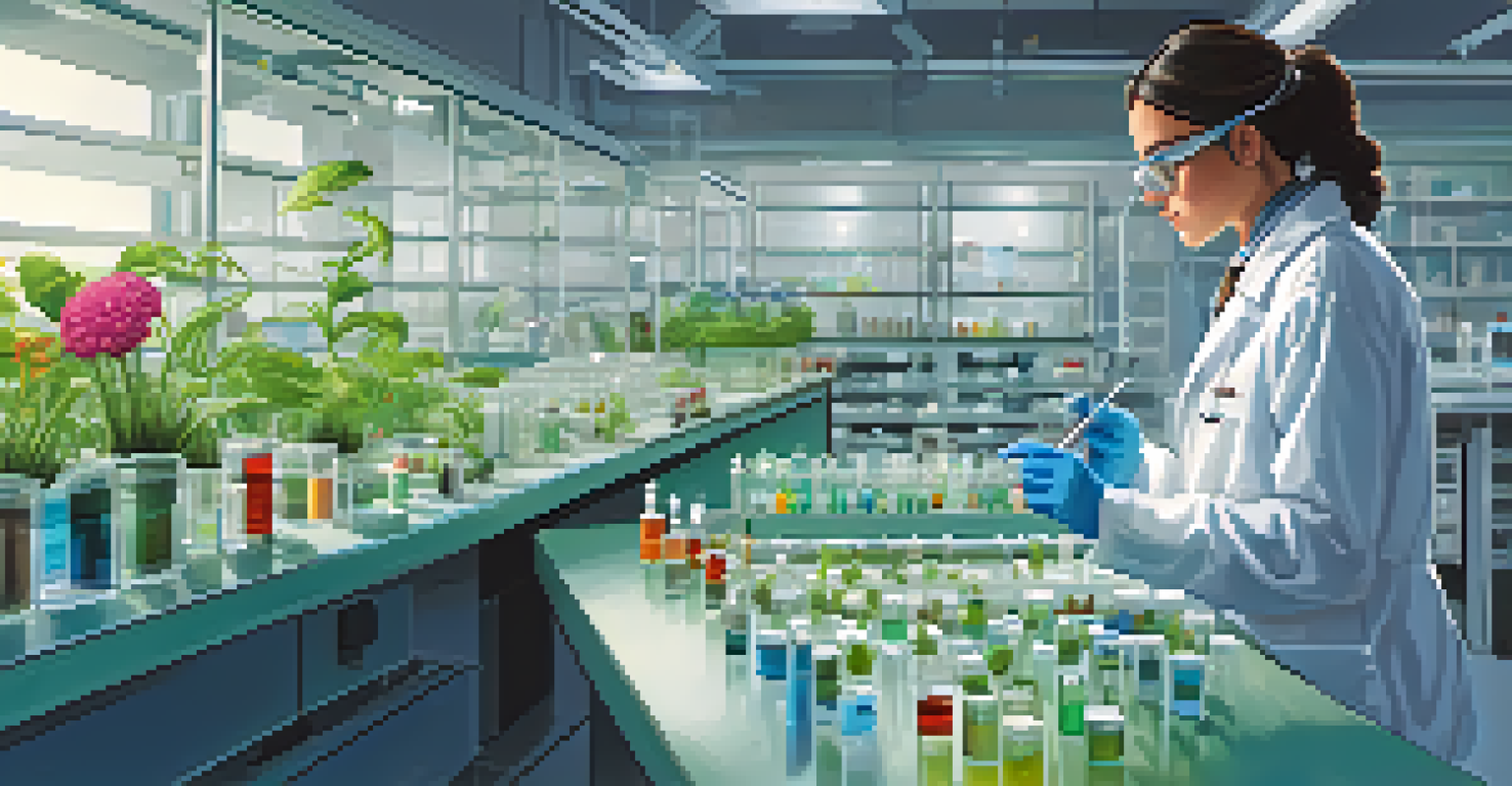Biotechnology in Climate Change Mitigation for Plants

Understanding Climate Change and Its Impact on Plants
Climate change presents numerous challenges to plant life, affecting growth, reproduction, and survival. Rising temperatures, altered rainfall patterns, and increased CO2 levels can stress plants, making them more susceptible to diseases and pests. This not only threatens biodiversity but also jeopardizes food security and ecosystems around the globe.
Climate change is a reality, and it is happening now. We must adapt to changes in our climate to ensure food security and sustainability.
Plants are vital for maintaining ecological balance, but as climate change progresses, their ability to adapt naturally diminishes. For instance, crops may struggle to thrive in conditions they were not bred for, leading to lower yields. Understanding these impacts is crucial for developing strategies to enhance plant resilience against climate change.
Biotechnology has emerged as a powerful tool to address these challenges. By harnessing genetic modifications and other biotechnological advances, scientists aim to create plant varieties that can withstand extreme weather conditions and improve overall productivity.
What is Biotechnology in Agriculture?
Biotechnology in agriculture involves using scientific tools and techniques to modify plants for better performance. This can include traditional methods like selective breeding, as well as advanced techniques such as genetic engineering. The goal is to enhance desirable traits, such as drought tolerance, pest resistance, and improved nutritional content.

One of the most well-known examples of biotechnology is genetically modified organisms (GMOs), which have been engineered to express traits that benefit farmers and the environment. For instance, Bt cotton has been modified to produce a protein that is toxic to certain pests, reducing the need for chemical pesticides. This not only helps farmers save money but also decreases environmental impact.
Biotechnology Enhances Plant Resilience
Advancements in biotechnology, including genetic modifications and CRISPR technology, are crucial for developing plant varieties that can withstand climate challenges.
The application of biotechnology can significantly speed up the process of crop improvement. While traditional breeding can take years, biotechnological advances can yield results in a fraction of the time, making it a vital ally in the fight against climate change.
Biotechnological Approaches to Enhance Plant Resilience
Several biotechnological approaches are being explored to help plants cope with climate change. One method involves genetic modification to introduce genes responsible for stress tolerance from other plant species. For example, researchers are working on inserting genes that enhance drought resistance, allowing crops to maintain yield even in dry conditions.
Biotechnology is not a panacea, but it can play an important role in addressing the challenges of food security and climate change.
Another exciting avenue is the use of CRISPR technology, which allows for precise editing of plant genomes. This method can quickly develop plants that have improved traits without introducing foreign DNA, addressing some public concerns about GMOs. With CRISPR, scientists can enhance traits like nutrient uptake and disease resistance, making plants more sustainable.
The integration of biotechnology with traditional breeding strategies can also lead to hybrid plants that combine the best traits of both worlds. This synergy can result in plants that are not only more resilient but also better suited to changing climate conditions.
Improving Crop Yields Through Biotechnology
Biotechnology plays a crucial role in enhancing crop yields, which is essential as global food demand rises. By developing varieties that can thrive in suboptimal conditions, such as poor soil or limited water, biotechnology can help farmers produce more food with fewer resources. This is especially important in regions most vulnerable to climate change.
For instance, researchers have developed drought-tolerant maize varieties that can yield significantly more than traditional varieties under dry conditions. Such advancements not only benefit farmers economically but also contribute to food security as the world grapples with growing populations and climate unpredictability.
Microbial Solutions Improve Crop Health
Utilizing beneficial microorganisms in agriculture can significantly boost plant health, nutrient absorption, and resistance to diseases.
Moreover, biotechnology can help reduce losses due to pests and diseases, further boosting yields. By creating plants with built-in defenses, farmers can decrease reliance on chemical pesticides, promoting a healthier environment.
The Role of Microbial Biotechnology in Plant Health
Microbial biotechnology refers to using beneficial microorganisms to enhance plant health and growth. These microbes can help plants absorb nutrients more efficiently, improve soil quality, and even protect against diseases. By promoting a healthy microbial environment, farmers can foster more resilient crops.
For example, mycorrhizal fungi form symbiotic relationships with plant roots, increasing their ability to uptake water and essential nutrients. This is particularly beneficial in drought-prone areas, where plants often struggle to access enough resources. By incorporating microbial solutions, farmers can enhance the resilience of their crops against climate-induced stress.
Furthermore, biopesticides derived from natural organisms can help manage pest populations without harming beneficial insects. This holistic approach not only protects crops but also supports biodiversity, creating a more sustainable agricultural ecosystem.
Challenges and Ethical Considerations of Biotechnology
While biotechnology offers numerous benefits, it also comes with challenges and ethical considerations. Public perception of GMOs can be mixed, with some consumers wary of genetically modified products. Addressing these concerns requires transparent communication and education about the safety and benefits of biotechnological innovations.
Additionally, there are environmental concerns regarding the potential impacts of genetically modified crops on local ecosystems. For instance, the spread of modified genes to wild relatives can lead to unintended consequences. It is essential for researchers and policymakers to establish regulations that protect biodiversity while promoting the responsible use of biotechnology.
Ethical Concerns Surround GMOs
While biotechnology offers promising solutions for agriculture, public skepticism and environmental impacts necessitate careful consideration and transparent communication.
Balancing innovation with ethical considerations is crucial. Ongoing dialogue among scientists, farmers, consumers, and regulators can help ensure that biotechnology serves as a sustainable solution to climate change challenges in agriculture.
Future Prospects of Biotechnology in Climate Change Mitigation
Looking ahead, the future of biotechnology in climate change mitigation for plants is promising. As technology continues to advance, we can expect even more innovative solutions that enhance plant resilience and sustainability. The integration of artificial intelligence and data analytics may lead to more precise breeding techniques and optimized farming practices.
Moreover, global collaboration among researchers and institutions can accelerate the development and deployment of biotechnological solutions. By sharing knowledge and resources, countries can work together to address the pressing challenges posed by climate change, ensuring food security for all.

Ultimately, biotechnology holds the potential to transform agriculture into a more sustainable and resilient sector. As we face the realities of climate change, embracing these innovations will be vital for the future of food production and environmental health.